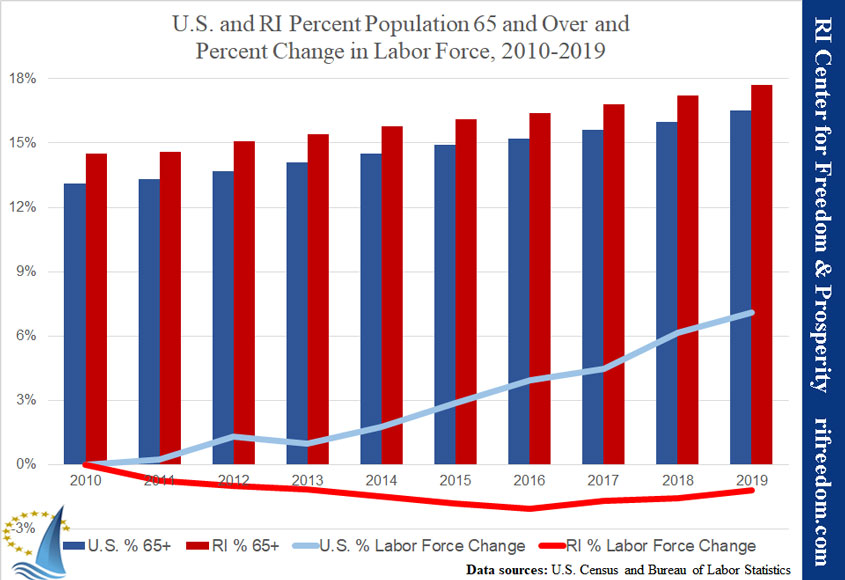Aging Population No Excuse for RI
Some folks are deeply invested in the idea that Rhode Island is not an economic basket case, and it’s educational to argue with them, if only as an example of how such arguments go.
For years, we’ve published information about Rhode Island’s economy over time and compared with other states. We’ve looked at employment, labor force, population, income, taxes, and more. Obviously, we all live here for a reason, so there are positives to find — regionally, historically, culturally, and all that elusive “quality of life” stuff. There’s a reason we put up with the garbage from government around here. But if we’re talking economics, Rhode Island’s story is simply not good.
So, what the apologists for the status quo do is to pick through the many datapoints and tease out any for which they think they can make excuses. Are productive people leaving the state? They’ll obscure the issue by saying, “It’s not true that the rich aren’t leaving.” OK, but that’s not the claim. Next they’ll say, “There are all sorts of reasons people leave an area.” OK, but if they’re leaving here more than other places, and more than they used to, then it’s worth figuring out the reason.
Similarly, a commenter on this site likes to sneer at one of the six charts on our regular employment posts, which compares the unemployment rate with what it would be if Rhode Island hadn’t lost so much of its labor force since the Great Recession.
While this chart was more specifically useful when the recession was still recent, it remains instructive. If fewer people in our state are employed or looking for work (which together make up the labor force), it’s a sign that the economy isn’t generating jobs and the state isn’t attracting (or keeping) the sorts of residents who want to work. We can have a variety of interesting discussions over what might make that trend more or less worrisome or even desirable, but in the context of multiple trends, it’s worth considering.
Most recently, this commenter made the claim that we shouldn’t be concerned about a shrinking labor force because it only indicates that the percentage of the population that is retired has gone up, implying that it’s gone up more in Rhode Island than elsewhere. Whether that is or is not a reason for concern is worth debating, but the first question is: Is it true?
Only partly. According to data from the U.S. Census, the percentage of Rhode Island’s population over the age of 65 did indeed go up 22% from 2010 to 2019. However, the same percentage for the whole country was 26%. In other words, if we’re comparing Rhode Island to the rest of the country, the “aging population” thing should have helped us. That is, our labor force should have shrunk less than the country as a whole.
So what actually happened? Look for yourself, using data from the Bureau of Labor Statistics.

The blue and red columns show the percentage of the population over 65 in the United States and Rhode Island, respectively. The blue and red lines show the percentage change in the labor force checked in December for each. Although the percentage of the population above typical working years increased in both cases and Rhode Island’s labor force decreased, the U.S. labor force actually increased.
We should expect the argument to pivot from here. Maybe: “Oh, but that’s because the population of the United States grew, and nobody wants more traffic here in Rhode Island.” Or whatever. Again, I say, fine: If our state’s plan is to keep the economy tepid so as to avoid overcrowding, let’s have that conversation.
But let’s admit reality as we do so.




